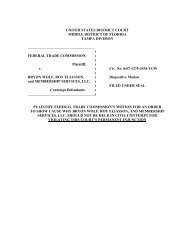Comments on the definition of the Internet and the importance of ...
Comments on the definition of the Internet and the importance of ...
Comments on the definition of the Internet and the importance of ...
Create successful ePaper yourself
Turn your PDF publications into a flip-book with our unique Google optimized e-Paper software.
Finally nmap tells what it did:<br />
Nmap finished: 1 IP address (1 host up) scanned in 2.184 sec<strong>on</strong>ds<br />
The informati<strong>on</strong> returned by nmap helps to show us what <strong>the</strong> Net is. My<br />
machine is c<strong>on</strong>nected to <strong>the</strong> Net. My machine has an address which<br />
allows o<strong>the</strong>r machines <strong>on</strong> <strong>the</strong> Net to send data to my machine in order,<br />
perhaps, to start two streams <strong>of</strong> data flowing between <strong>the</strong> two<br />
machines. Suppose that you also have before you a computer c<strong>on</strong>nected<br />
to <strong>the</strong> Net. Again, we assume that you have full c<strong>on</strong>trol <strong>of</strong> your box.<br />
We now present a well known, popular, <strong>and</strong> paradigmatic, use <strong>of</strong> <strong>the</strong><br />
<strong>Internet</strong>:<br />
You might have opened port 80 <strong>on</strong> your box, <strong>and</strong> placed a program called<br />
an "http daem<strong>on</strong>", say Apache, to listen for incoming requests <strong>on</strong> port<br />
80. I might start a Web browser, say Firefox, <strong>on</strong> my machine <strong>and</strong> tell<br />
my browser to ask for a web page <strong>on</strong> your machine. Firefox would now<br />
knock <strong>on</strong> port 80 <strong>on</strong> your machine, <strong>and</strong> request <strong>the</strong> page.<br />
This is <strong>the</strong> mechanism by which web pages are delivered. Between your<br />
machine <strong>and</strong> mine lies <strong>the</strong> Net. Today, within <strong>the</strong> Net, <strong>the</strong>re is no<br />
third party wiretapping our communicati<strong>on</strong>. There is no third party<br />
attempting to determine <strong>the</strong> value <strong>of</strong> our c<strong>on</strong>versati<strong>on</strong> to us, in order<br />
to charge us extra for valuable c<strong>on</strong>versati<strong>on</strong>s. There is no third<br />
party examining our c<strong>on</strong>versati<strong>on</strong> in order to silence us if we say<br />
things <strong>the</strong> wiretapper's boss finds unpleasant.<br />
I should have said "In <strong>the</strong> best circumstances, <strong>the</strong>re is no ..."<br />
because, if your machine were in <strong>the</strong> United States, <strong>and</strong> mine in China,<br />
<strong>and</strong> if our c<strong>on</strong>versati<strong>on</strong> were to include menti<strong>on</strong> <strong>of</strong> movements not<br />
favored by <strong>the</strong> government <strong>of</strong> China, <strong>the</strong>n China might act to stop our<br />
c<strong>on</strong>versati<strong>on</strong>. And if your machine were in <strong>the</strong> United States <strong>and</strong> your<br />
"<strong>Internet</strong> Service Provider" refused to pass that first packet to port<br />
80 <strong>on</strong> your machine, <strong>the</strong>n our c<strong>on</strong>versati<strong>on</strong> could not even get started.<br />
The policy <strong>of</strong> refusing that first packet to port 80 is <strong>of</strong>ten called<br />
<strong>the</strong> "no servers allowed" rule. Both interferences result in something<br />
that is not <strong>the</strong> full <strong>and</strong> true <strong>Internet</strong>.<br />
Let us list two o<strong>the</strong>r uses <strong>of</strong> <strong>the</strong> Net:<br />
1. You might want to send me some email. By c<strong>on</strong>venti<strong>on</strong>, usually port<br />
25 is used for email. If I choose to get email by <strong>the</strong> usual means, I<br />
must open port 25, <strong>and</strong> place a "mail transport agent", say exim,<br />
listening <strong>on</strong> <strong>the</strong> port. But we both might want to send email back <strong>and</strong><br />
forth by o<strong>the</strong>r means. In that case, you <strong>and</strong> I might have agreed<br />
before h<strong>and</strong> to use ano<strong>the</strong>r port, or set <strong>of</strong> ports, <strong>and</strong> we might have<br />
agreed <strong>on</strong> some o<strong>the</strong>r protocol for delivery <strong>of</strong> email. We are free to<br />
make our own arrangements, without asking permissi<strong>on</strong> <strong>of</strong> any third<br />
party.<br />
2. Assume you are a master sysadmin <strong>and</strong> an old friend. I might be<br />
having trouble with my computer, <strong>and</strong> I might ask you, by teleph<strong>on</strong>e<br />
say, to come into my box <strong>and</strong> have a look around in order to help me.<br />
We might have agreed that you would come in via "secure shell", that

















